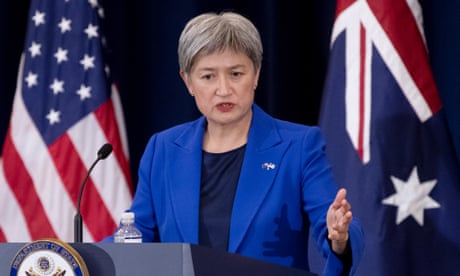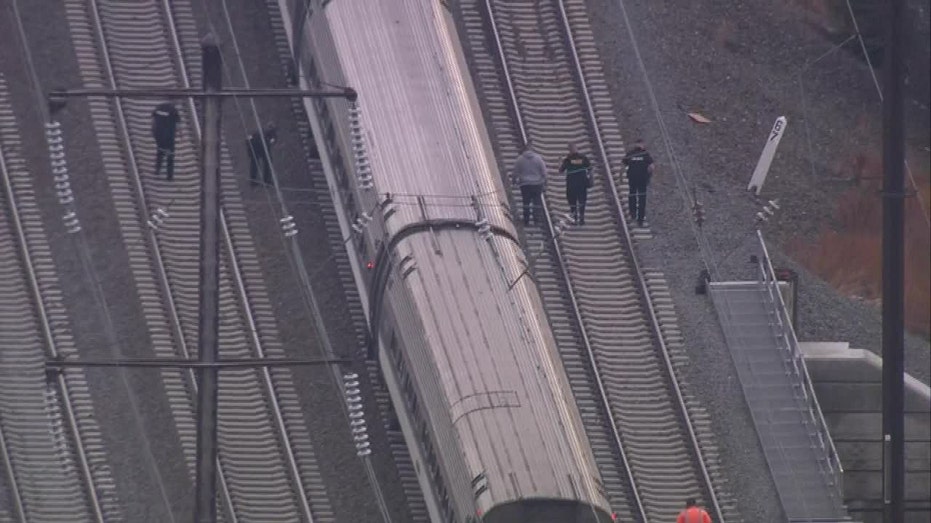- by foxnews
- 05 Apr 2025
Penny Wong issues emphatic plea to US and China to ‘prevent catastrophe’ of war
Penny Wong issues emphatic plea to US and China to ‘prevent catastrophe’ of war
- by theguardian
- 08 Dec 2022
- in news

Australia's foreign affairs minister, Penny Wong, has urged China to take up a US offer to put in place "guardrails" to prevent growing tensions from spiralling into war.
Wong will use a speech in Washington DC on Thursday to hit back at claims that Australia's plan to acquire nuclear-powered submarines under Aukus is driving a regional arms race.
Wong will also urge the leaders of China and the US to learn from diplomacy spurred by the Cuban missile crisis, saying she hopes "nationalistic domestic posturing won't sink their efforts to build safeguards".
While noting that some analysts have compared the current situation to the lead-up to the first or second world wars, Wong will make an emphatic plea for considered choices: "We are not hostages to history. We decide what we do with the present."
The US and Australia agreed this week to deepen their defence cooperation, paving the way for increased rotation of US forces and the pre-positioning of fuel and munitions in the country.
But while outlining numerous criticisms of China for "destabilising actions in the South China Sea" and "dangerous encounters at sea and in the air", the statement issued by the allies also warned against allowing this to escalate into conflict.
Wong will call for the growing strategic competition between the major powers to be managed responsibly.
She will say the 1962 Cuban Missile Crisis "drove more effective communications between the US and the Soviets". These led to missile and arms reduction treaties that increased transparency and placed limits on weapons numbers and delivery.
Wong will welcome the leadership shown by the US president, Joe Biden, who has raised with his Chinese counterpart, Xi Jinping, the need to pursue "guardrails that enable responsible management of competition".
"It is in all the world's interests that his overtures are met," Wong will tell the Carnegie Endowment for International Peace in Washington DC, according to speech notes distributed by her office in advance.
"We hope that what Kevin Rudd describes as 'the turbocharging of Chinese nationalism' has not made international cooperation impossible."
Wong will say the kind of international leadership needed to "prevent catastrophe" must be supported and encouraged across the political systems of both China and the US. The region will be safer if China takes up the offer, she adds.
Wong, who has travelled extensively to Pacific island countries and south-east Asia since taking office in May, says most of the region wants peace, predictability and prosperity.
But she notes the region is "not enthusiastic about great power competition" and "doesn't want to be forced to take sides". She will say the Albanese government will put "listening above lecturing".
Wong will say Australia sees its increased spending on defence capabilities - including nuclear-powered submarines under the Aukus pact - as "essential for deterring conflict in our region" and allowing countries to "make their own choices".
"This is why it's important that we correct suggestions that such improvements in our capabilities are a source of disruption in our region," Wong says.
"One of the persistent claims we hear in the region is that Aukus is driving an arms race or the militarisation of our region."
Wong will urge China to take steps to promote transparency in the area of nuclear weapons and to be more open about its rapid military buildup.
She says Australia has committed to transparency in its ambition to acquire nuclear-powered submarines and is steadfast in support of the Treaty on the Non-Proliferation of Nuclear Weapons.
Proceeding with those Aukus plans will be top of the agenda when Australia's deputy prime minister, Richard Marles, meets with the defence secretaries of the UK, Ben Wallace, and the US, Lloyd Austin, on Thursday.
While the Australian government has been seeking to "stabilise" the rocky relationship with China, it has repeatedly said Australia's substantive policy positions remain unchanged.
China's ambassador to Australia, Xiao Qian, said on Wednesday diplomats from the two countries were in talks on next steps for cooperation, after the "very successful" meeting between Xi and Anthony Albanese in Bali last month.
"We're ready together with the Australian side to bring the relationship back on the right track," he told a webinar hosted by the Australia-China Relations Institute at the University of Technology Sydney.
He says diplomats were examining the areas in which the countries could cooperate, the areas where they had differences, and the concerns from each side.
The Australian ambassador to China, Graham Fletcher, told the same event both governments were now better aware of where the "firm lines" in the relationship were.
He said the difficulties had "not gone away" and were "not trivial" but there was no need to focus exclusively on them.
"Problems need to be recognised and addressed and if possible progressed but, if not, managed so they don't become damaging," Fletcher said.
China's foreign ministry responded cautiously to Wednesday's announcement that the US and Australia would welcome Japan's participation in troop rotations.
A spokesperson, Mao Ning, said the US kept creating "small circles with some of its allies" and those actions "would only undermine regional peace and stability".
- by foxnews
- descember 09, 2016
Excavation near site where Jesus was crucified and buried results in ancient discovery
Proof of ancient olive trees and grapevines, consistent with a Bible verse, has been found at the Church of the Holy Sepulchre in Jerusalem, an archaeologist confirms.
read more


